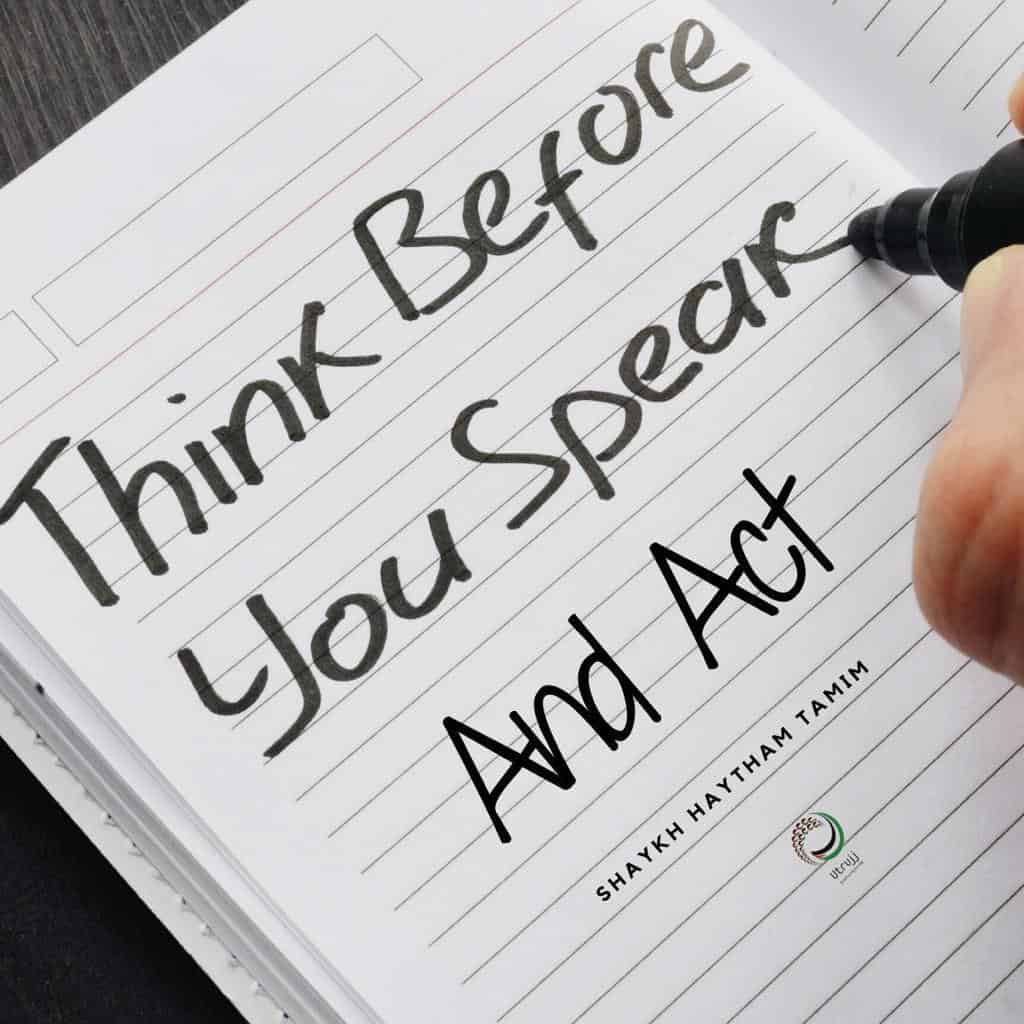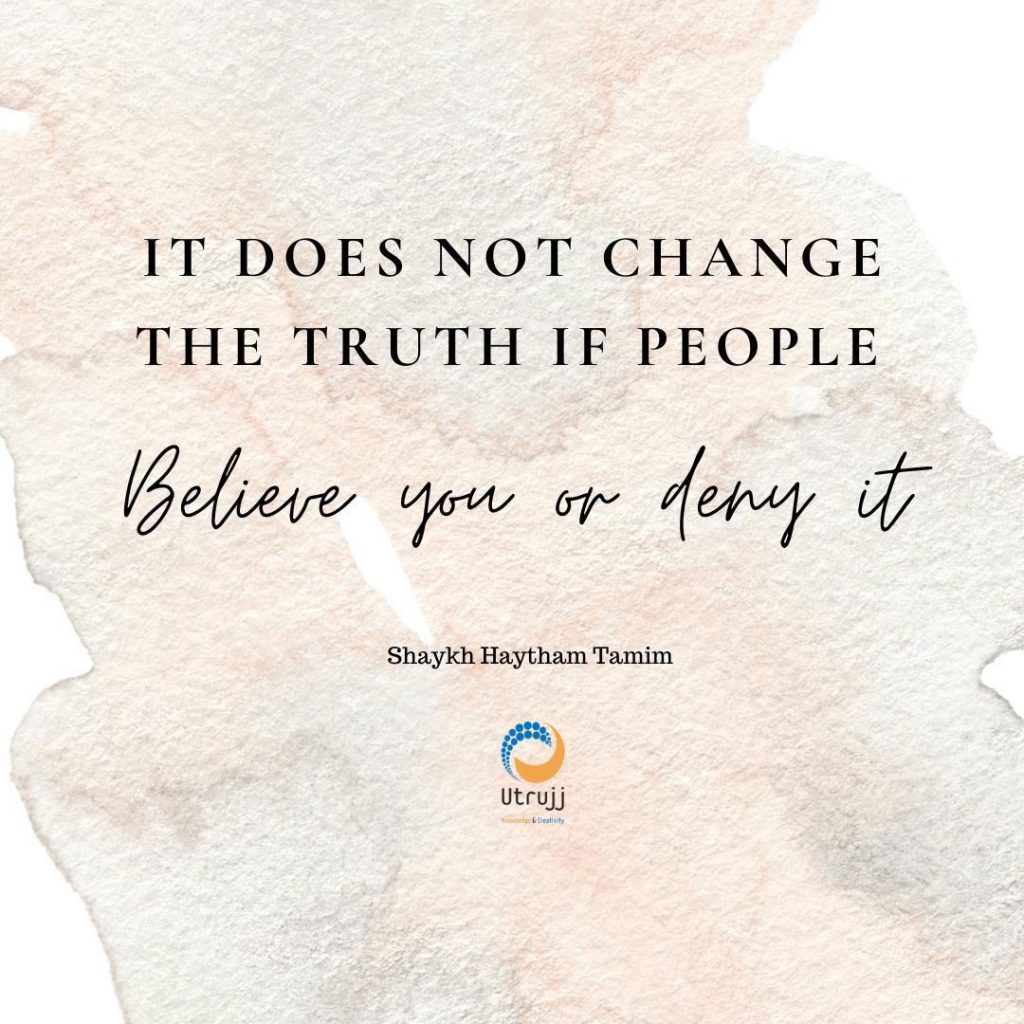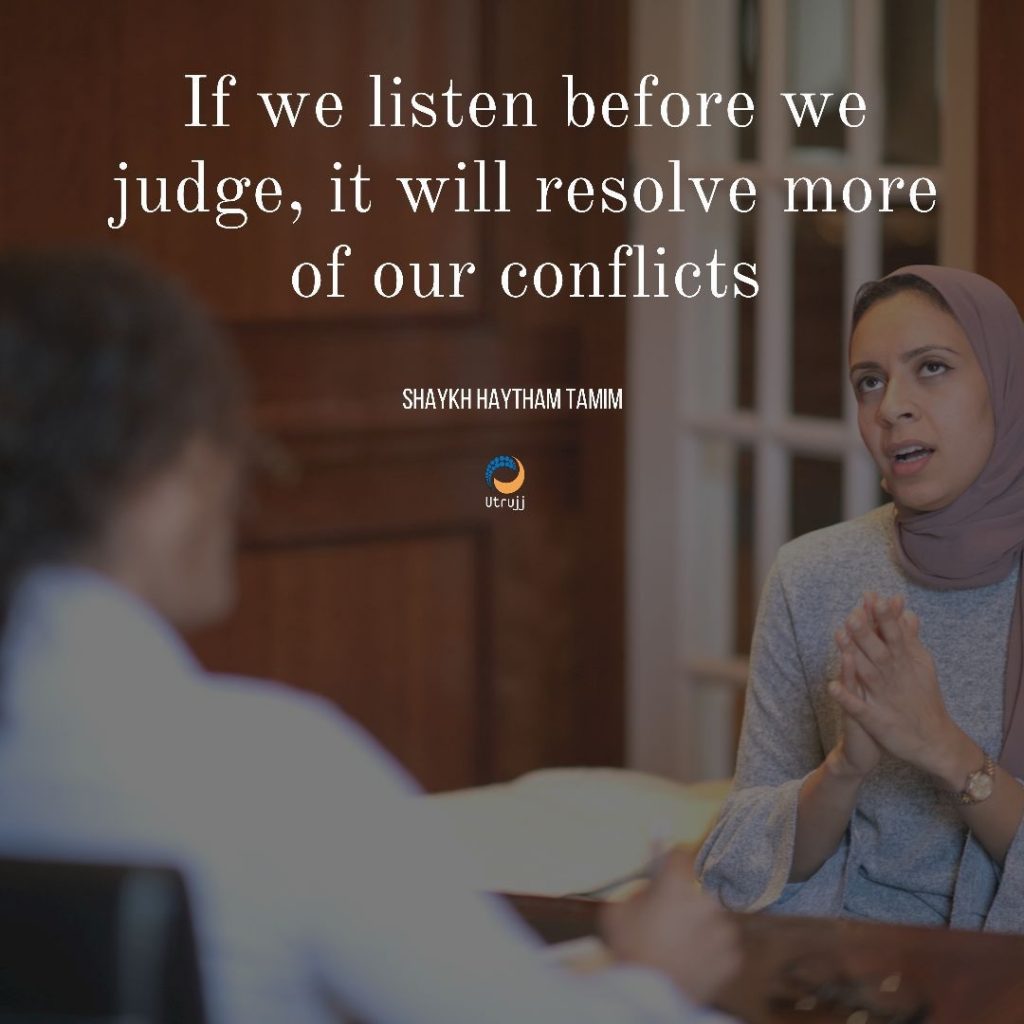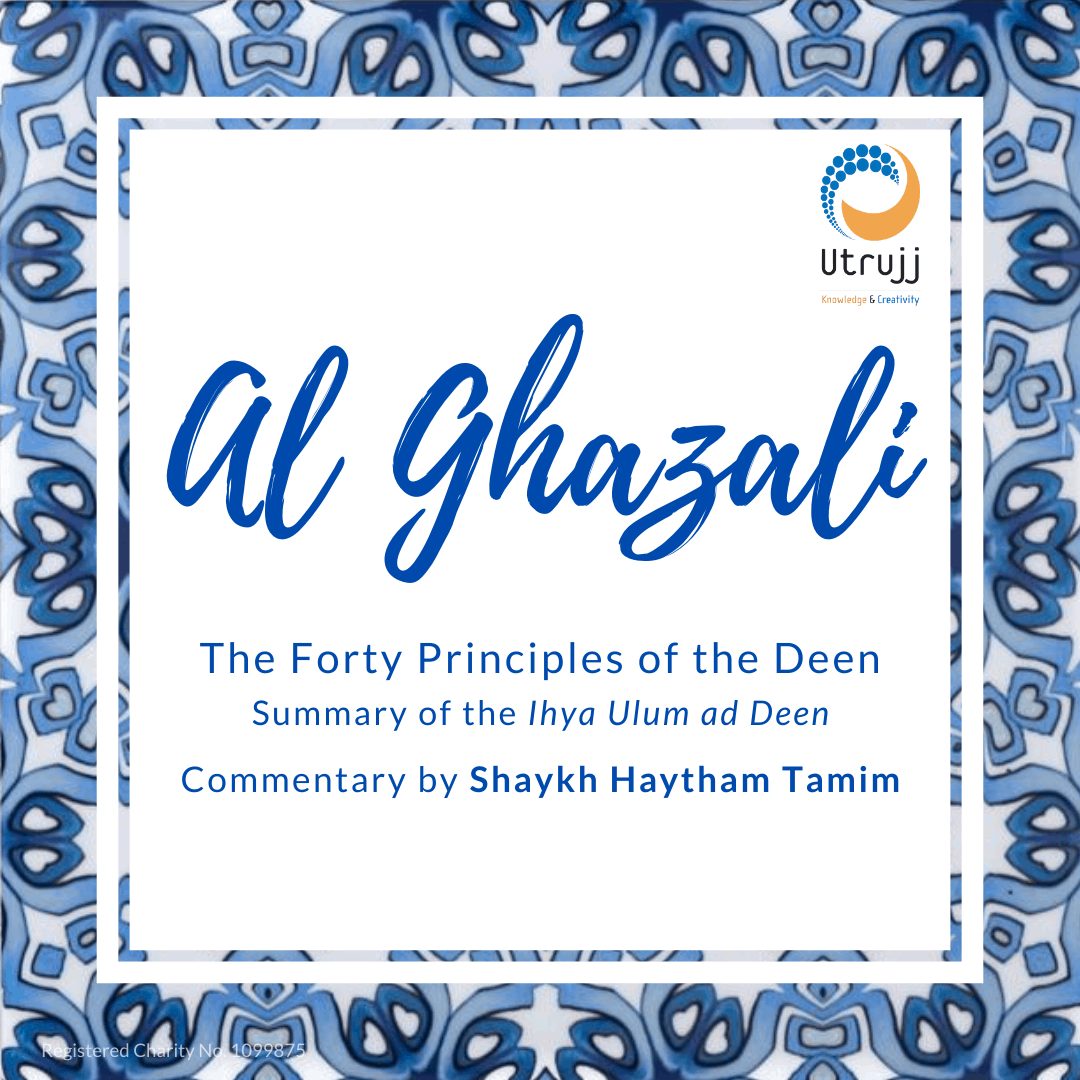Ghazali on arguing

Imam Ghazali’s book, Kitaab Al-Arba’in Fi Usul ad-Din, ‘The Forty Principles of the Religion,’ which he wrote before his death, is a summary of Ihya Ulumuddin,
In his chapter entitled Tazkiya al Qulub, The Purification of the Heart, he pinpoints the blameworthy characteristics we need to extract from our heart and explores the evils of the tongue. Arguing is the third ailment of the tongue. It is a trait which Allah mentions in Surat al Anam:
Surely the devils whisper to their ˹human˺ associates to argue with you. (6:121)
Argumentation: jidaal and mira
Ghazali mentions this topic in a couple of pages in his Forty Principles but covers it in more detail in his grand work, Ihya Ulum ad-Din.
Mu’adh ibn Jabal reported that the Messenger of Allah (peace be on him) said:
“I guarantee a house on the outskirts of Paradise, a house in the middle of Paradise, and a house in the highest part of Paradise for one who gives up arguing even if he is right, who gives up lying even while joking, and who makes his character excellent.” (al-Mu’jam al-Kabir)
He also said:
The believer will not reach the highest level of imaan until he leaves arguing even if he is right. (Tabarani)
To leave an argument when you are wrong is the obvious thing to do, but to leave an argument when you are right is a struggle. This is why it is rewarded, because you are not escalating the trouble.

Avoid confrontations and disputes
Without doubt, when we read the Quran there are many verses addressing the issue of argumentation. If you search jadala and jidaal in the Quran it is almost always negative.
Allah prohibited jidaal during hajj:
Hajj takes place in the specified months, and anyone undertaking this duty must not: engage in sexual intimacy (with one spouse); commit sin or quarrel with each other (2:197)
When you are at Hajj you are there to fulfil your obligations, and arguing undermines and subverts this.
The exception is when you have to enter a dispute to clarify the truth, particularly if someone is misleading people
Arguing out of ego
And of the people is he who disputes about Allah without knowledge or guidance or an enlightening book [from Him], twisting his neck [in arrogance] to mislead [people] from the way of Allah. For him in the world is disgrace, and We will make him taste on the Day of Resurrection the punishment of the Burning Fire. [22:8-9]
The Quraysh would argue and argue about anything and everything. They were not arguing because their intention was to find the truth, but to make life difficult for the Prophet (peace be on him) and show they were different. Even if they agreed with him deep down, they wanted to show they were different.
The lesson in this for us is that when you discover something is right, admit it and acknowledge it is right.
In Arabic the phrase ‘a Byzantium argument’ is a disagreement that goes on and on and on and leads to a dead end. It is arguing for the sake of arguing, wasting everyone’s time.
Allah Almighty blames those who get into arguments. He says:
And argue not with the people of the Scripture (Jews and Christians), unless it be in (a way) that is better (with good words and in good manner, inviting them to Islamic Monotheism with His Verses), except with such of them as do wrong; and say (to them): “We believe in that which has been revealed to us and revealed to you; our Ilah (God) and your Ilah (God) is One (i.e. Allah), and to Him we have submitted (as Muslims).” (29:46)

Sunnah
When we have multiple narrations, with different wordings, on multiple occasions on the same topic, it shows that the Prophet (peace be on him) had to repeatedly address a problem that was prevalent in the community.
This is why he set the boundaries, etiquettes, consequences of arguing and offered solutions and reminded people of the rewards of adhering to Quranic advice. In a very strong hadith, reported by Abu Umamah, the Messenger of Allah (peace be upon him) said:
“No people are led astray after being guided but that they indulged in arguments.” Then, the Prophet recited the verse, “They strike an example for you only to argue. Rather, they are a quarrelsome people.” 43:58) (Musnad Ahmed, Tirmidhi Ibn Majah)
Previous nations had a predisposition and predilection for arguing. It was deeply rooted in their nature and evident in their behaviour so the Prophet (peace be on him) warned his Ummah not to repeat their mistakes. They were destroyed because of their argumentation.
Asking questions
Not getting into conflicts does not mean you are not allowed to ask questions. Rather, As sawalu nisful ilm:
A good question is half of knowledge. (Bayhaqi)
There is difference between asking for clarification and challenging someone simply for the sake of objecting.
Check intention
In any argument you need to check your intention. Are you asking for clarity? Or do you have internal issues which are driving you to quarrel?
There may be internal issues in your mind, heart or ego which are taking you in the wrong direction. The Quran says the previous nations were destroyed for this trait:
And they said, “Are your gods better, or is he?” They did not present the comparison except for [mere] argument. But, [in fact], they are a people prone to dispute. (43:58)
Aisha (may Allah be pleased with her) narrated that the Prophet (peace be on him) said:
“The most hated person in the sight of Allah is the most quarrelsome person.” (Bukhari)
The one who argues cannot tolerate the fact that others are better than him. The one who argues doesn’t like to be defeated. And arguing creates grudges and ill feeling among people.
Part of our nature is to argue but that does not give us the licence to argue
It is part of our nature to get into discussions, however some people specialise in arguing. It might be your brother or sister, neighbour, friend or colleague. Whenever you speak to them, you cannot win. They always argue. This is very troublesome. Avoid this as it creates a heaviness in your heart.
In Surat al Kahf , Allah Almighty says, wa kanal insanu akthara in jadala:
The man is the most argumentative being. (18:54)
We have to control ourselves. We cannot argue on the grounds that this is our nature. We have to control this inclination. And train ourselves to restrain our tongues.
Politicians
Indeed the worst argumentative people are politicians. We are all to familiar with them ducking and diving to escape tricky or embarrassing questions during interviews. They are masters of evasion and wasting time. No wonder listeners and viewers are frustrated by their stubborn refusal to be honest and admit the truth.

Let us put forward our own views rather than be misrepresented
We do need those who can argue for the truth as this is communal obligation, to show the truth and give the right evidences. We need to be able to put forward our narrative, rather than having inaccurate misrepresentations of our views.
Without doubt, we need good representatives in the media, like Mehdi Hasan, who is good at demolishing the clumsy tropes, biases and false representations of Muslims which abound.
There is a reward for the one who debates with good manners to show the truth.
Arguing is instigated by shaytan
Lo! The devils do inspire their followers to dispute (Surat al Anaam, 6: 121)
If you think and analyse some arguments you have been in, you will see that shaytanic whispers crept into them, and egos. Often, they are fuelled by a desire to show that you know better, or to cut the other person down to size. This one upmanship is the wrong intention.
Abu Hanifa (may Allah be pleased with him) was a great debater of theology before he became dedicated to fiqh. He was masterful in putting forward analysis, evidence and proofs. However when he noticed that his son, Hammad, was debating in the mosque, he was not pleased. Hammad asked respectfully why his father, who was renowned for having this skill, was discouraging his son from it. Abu Hanifa explained that when he contested someone’s opinion, he wished that the truth to emerge and to even come from his opponent’s mouth. Whereas, his son appeared to be arguing out of a desire to defeat the others and show he could beat them.
Arguing is not about winning, it is about ascertaining the truth.
Sometimes when we are in the heat of the discussion, the nafs barges in and takes centre stage spurred on by shaytan.
Having a discussion for the sake of clarifying ideas or weighing up pros and cons is fine, but not when one side is adamant that ‘It’s my way or the highway.’ This is sinful and evokes grudges and ill feeling.

The ummah and learning to draw the line when there is a difference of opinion
The Prophet (peace be on him) wanted his ummah to avoid arguments. Scholars say it is one of the great tests in every community where and when to draw the line in a conflict. Usually, once there is a difference of opinion, the matter escalates. We need to learn to step back and realise that we do not want to get embroiled in it.
Pick your battles
Ali (may Allah be pleased with him) used to say that he never had a discussion with a scholar without defeating him. And he never had a discussion with a lay person which he won. In other words, he advised being aware of who you wrangle and to avoid arguing with anyone ignorant. He said:
The moment you start arguing with an ignorant fool, you have already lost.
Ibn ‘Abd al-Hakam reported that Al-Shafi’i (may Allah have mercy on him) said:
“Among the degradation of knowledge is that you debate everyone who debates you, or you argue with everyone who argues with you.” (Bayhaqi)
The Prophet (peace be on him) wanted us to adhere to our principles and live in peace. He told Aisha (may Allah be pleased with her) when he recited the opening of the Surat al Imran, that when people argued about the clear and unclear verses of Allah, it would be a fitnah.
We have to avoid falling into this fitnah. If you have the skill to debate, don’t abuse it by denying the truth and arguing for falsehood.
Laylatul qadr, Siyam and Hajj
In the famous narration, we know that arguing led to the knowledge of the date of Lailatul Qadr beign taken away. Ubada bin As-Samit (may Allah be pleased with him) narrated:
The Prophet came out to inform us about the Night of Qadr but two Muslims were quarreling with each other. So, the Prophet said, “I came out to inform you about the Night of Qadr but such-and-such persons were quarrelling, so the news about it had been taken away; yet that might be for your own good, so search for it on the 29th, 27th and 25th (of Ramadan). (Bukhari)
We also know that we have been warned not to argue when we are fasting, and when we are on hajj. On a daily basis, steering clear of arguments keeps you away from trouble and falling victim to your own ego.
Umm Salama reported Allah’s Messenger (ﷺ) as saying:
You bring to me, for (judgment) your disputes, some of you perhaps being more eloquent in their plea than others, so I give judgment on their behalf according to what I hear from them. (Bear in mind, in my judgment) if I slice off anything for him from the right of his brother, he should not accept that, for I sliced off for him a portion from the Hell. (Muslim)
The Prophet (peace be on him) was saying that he was only a human, and when claimants bring to me their evidences if some more eloquent than others he might be mislead by their proof. So they had to understand the seriousness of perverting the course of justice through their arguments:
This is why Abu Hanifa was angry. If Allah gave you these skills don’t use them to manipulate others.
Arguments spread
Imam Awzai (may Allah be pleased with him), one of the great scholars from the same era as Imam Malik and Abu Hanifa, said that if Allah wants evil for some people then He allows argument to spread among them and takes little action against them will be taken. Be careful not to get in this.
Some people have a big mouth. However, let your actions speak louder than your words. Imam Shafi said getting into argument makes your heart like stone and brings grudges to the heart. This is why we shouldn’t get into arguments.
Al Ghazali says you know when to stop arguing when you start objecting to your opponent’s opinion not because it is wrong but because you don’t like it.
The reason behind this is to show that you are better or your grace or status or knowledge.
I met someone who prepared what he would say each night to show up his colleagues the next day. This is awful. Be careful.
If there are no errors or distortions of the truth then don’t get into arguments for the sake of it.

Etiquettes
Even if someone has some mistakes in what someone says, if you want to correct him then the best thing is to follow the etiquettes. If there are serious mistakes then you should correct them, without getting into an argument.
There is a current trend to bash the Sunnah, and deny the authenticity of Sahih Bukhari, even those who have no idea about his biography are jumping on the band wagon to get fame. This is falling into shaytan’s traps.
Sometimes the wisest thing when you hear something wrong, is to ignore it.
If there is no benefit from an argument, don’t get involved. Sometimes you need to get involved to clarify what someone is saying to confuse the public. Then you need to go public with the right knowledge and intention. Otherwise the harm is more than the benefit.
You have to follow your principles as a Muslim. You can’t respond to someone’s foul language with foul language. Adab Al-Bahth wal munadharah is the science and art of debate. It is very useful to study and is a new science with new etiquettes. The most important thing in a debate is to keep monitoring your intention. If your intention is to show the truth that is fine. If it is about winning it is wrong. Everyone likes winning but not at the expense of your principles.
Make your reference the divine.
In an argument between husband and wife, be careful not to correct and criticise all the time. Between a boss and employee, sometimes the boss will wrong, and should accept this.
You need to filter your intention. If your opponent is right, submit and accept he is right. Not because you did not win but because you are interested in the truth.
Work on your ego
Some people can’t tolerate a different opinion. If an argument gets heated, even if you are right, extricate yourself from the argument, and diffuse the situation. Don’t put fuel on the fire.
Even if you are right, keep the peace, especially in your marriage.
Keeping the peace is more important than winning.
It is easier said than done. A win at the expense of your friendship or marriage or job is not a win. Don’t let shaytan control you.
We ask Allah Almighty to keep our intentions pure and our vision clear. Ameen.
Shaykh Haytham Tamim – The Thursday Al Ghazali Class
Related posts
Evils of the tongue 2- backbiting
The benefits of feeling hunger
Why is following the sunnah the key to success. Ghazali’s secrets part 1
What is wrong with excessive laughter?
Do you have to practice what you preach?
Self righteousness when giving counsel
Brotherhood, friendship and wilayah
How to deal with difficult neighbours
The first 6 rules of how to deal with people
How to deal with people according to their status (9-11)
Cover the faults of others (12-13)
Defend others in their absence, be tactful, be cautious of the company of the rich (16-18)
- Cover the faults of others. Ghazali’s Rules 12-13 for dealing with people.
- How to deal with people according to their status. Ghazali rule 9-11
- Dealing with gossip and arguments. How to deal with people: Ghazali’s rules 7-8
- What do we learn from the Euros 2020? Lessons on success
- Should you only drink while sitting down?


Recommended Posts

The truth is more powerful than lies
July 26, 2024

Global IT outage. When systems go down…
July 19, 2024

